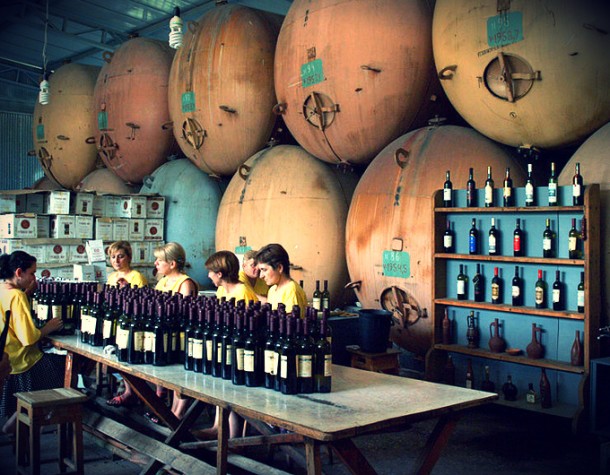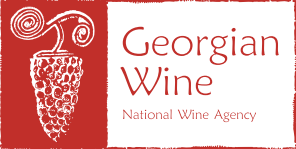
By Anna Vasileva, Yekaterina Drankina
MOSCOW - Russia’s Surgeon General, Gennadi Onishenko, is a well-known teetotaler who recommends not drinking for everyone, even on New Year’s Eve. So it came as a surprise last week when he spoke out enthusiastically about wines from neighboring Georgia.
“How long has it been since Georgian wine has been sold here?” Onishenko complained to a group of visiting Georgian winemakers, whose visit, incidentally, had been delayed because they could not get visas for several months. “If politics doesn’t get in the way, Georgian wine will be back in Russian stores.”
The Surgeon General was the one who banned the sale of Georgian wine back in 2006. Of course, that was not for political, or economic reasons, but rather due to unsanitary conditions.
There were some small squabbles during the meeting. The Georgians said that there was no way to comply with all of the procedures for the restoration of trade before the summer, while Onishenko shook their hands and said that it needs to be done sooner, in the spring.
Although Onishenko has not even looked at Georgian wine since 2006, he is certain that the quality has improved enormously. A group of Russian representatives plans to visit 60 Georgian winemakers in their own country, to take care of some of the paperwork, and immediately thereafter even those who didn’t go will be able to pour themselves a glass of Georgian wine. Onishenko says that Georgia will sell at least 10 million bottles a year in Russia.
Paradoxically, the Russian embargo on Georgian wine has helped the Georgian wine industry. Before the embargo, 80% of the wine exports went to Russia, and then suddenly that market was gone. It seemed like the end of Georgian wine. But today, the total value of the Georgian wine exports is only 30% less than it was at the peak in the early 2000s, but they are selling less than half the number of bottles. That means that Georgians are selling significantly their wine at a higher price than before.
“The government really did strongly insist that everyone work hard on the quality,” said Georgi Salakiya, the director of Badagoni, a well-known Georgian winery. “It was very important to strictly control the grape vintage, which allowed us to crack down on counterfeits. The wine improved quite a lot.” Georgia’s main markets are in Ukraine, Kazakhstan and Belorussia, but they making inroads even in Western Europe and the United States.
There hadn’t been much talk of lifting the embargo. From the Georgian point of view, it wasn’t really “that bad.” Mikhail Saakashvili even thanked the Russian government for the embargo, saying that it forced the wine industry to examine itself and understand its real possibilities.
But everyone seems happy about the end of the embargo. Badagoni, which has never worked in the Russian market, is prepared to produce an additional one million bottles for the Russian market. “We’ll have a whole line for the Russian market. We don’t want to compete with the cheap wines - we’ll compete with the most expensive, the legendary wines,” Salakiya said. The most expensive wine the company plans to sell will cost around $66.
Even companies like Alaverdi, which sold in Russia for many years and were burned when their sole export customer barred them from the market, plan to increase production. Alaverdi now exports to 12 countries and was initially skeptical about re-entering the market. Now the company’s co-owner says he hopes Russians, who used to buy 1 million bottles a year, haven’t forgotten the taste of his wines.
No Rush
There are also several things that are blunting the wineries’ excitement. First is the state of the Russian wine market – during the embargo years, the competition has increased and the overall size of the market has actually decreased, at a rate of 2 to 3% per year. Russians remember a Georgian wine that was often counterfeit and poor quality, but today’s winemakers will not be selling for less than $10. It is also a bit late to appeal to Soviet nostalgia, when Georgian wine was available in all price ranges. Above $10, they’ll be competing with prestigious wines from France and Italy. Georgian winemakers will be entering the market completely cold.
But to give the Georgians their due, they have certainly learned how to successfully conquer new markets over the past couple of years. The real threat is elsewhere. When Onishenko made his cryptic statement about “if politics doesn’t interfere,” he knew what he was talking about. He was only able to see the success of the Georgian winemakers after Georgian President Mikheil Saakashvili’s United National Movement party lost the parliamentary elections last October. The next presidential elections are in October, and Saakashvili has the right to disband parliament right in between those two events – which would mean this April. Onishenko is trying to rush the wineries to do everything needed to reenter the Russian market in part so that they will put pressure on Saakashvili not to disband parliament and endanger the wine detente.
“If I were a winemaker, I wouldn’t make the investment. It’s still not clear how long this detente will last, there’s too much politics,” said Georgia expert Larisa Burakova. Pata Shesheldze, another expert on Georgian economics, pointed out that if it was a purely economic question, then the rules would have been made much more transparent. “It’s clear that the world has changed. Any old Georgian can’t just grab a bunch of oranges and a few dozen jugs of wine, hop the border and go sell it all at a bazar. That’s normal. But what the Russians are proposing – visiting each winery and verifying the quality by some unspecified means – first of all, it discriminates against small producers, because you can’t go to every village. Secondly, it presents an opportunity for corruption and third, the process could be reversed without any explanation whatsoever.”
Georgia has a history of corruption – President Saakashvili has thrown prominent business people in jail and then demanded huge sums of money in exchange for freedom. But he has generally considered foreign investment saintly, and Russian foreign investment has flowed into the country even when the political relationship between the two countries was at its worst. Saakashvili has cultivated strong trade agreements around the world, which is one of the reasons the Georgian economy has been growing at astounding rates.
Perhaps one day the Russian government will adopt Saakashvili’s enthusiastic approach to international trade, and start showing respect for international trading partners. For example, it’s shameful that Russia is insulting small but trustworthy Georgian winemakers. There’s a saying that if you spit on your neighbor it will fall on you. In fact, many Georgian winemakers are partially, or entirely, owned by Russian investors.
Read the article in the original language.
© Worldcrunch - in partnership with KOMMERSANT






